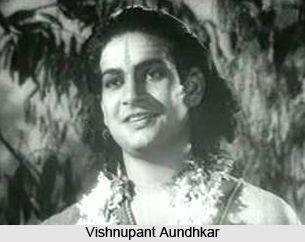 Vishnupant Aundhkar was a prominent theatre personality of the ancient Indian theatre. He was born in 1893. He was famous as a Marathi actor, playwright, and manager. Born in the tailor caste at Kolhapur, he did not have much formal education. He joined the Maharashtra Natak Mandali at the age of 14 and began his career in Marathi theatre as an actor of minor roles but started doing female leads in the company`s productions after their star, Potnis, left. His lack of beautiful feminine features was adequately compensated by his histrionic abilities. Yet his main ambition was to write. Consequently he left to work for Deccan Pictures Syndicate as a scenarist. After this, he founded the Samarth Natak Mandali, which became famous for its performances of historical drama composed by him, though it also staged plays by B. V. Warerkar. It did not last long, in spite of actors like Keshavrao Date, probably owing to paucity of funds and the emerging medium of cinema. Aundhkar himself served films. He scripted Vijay Bhatt`s Bharat milap or `Meeting Bharat` in 1942 and Ramrajya i.e. `Rama`s Reign in 1943, both blockbusters based on the Ramayana. Bhatt dedicated Ramrajya to his memory.
Vishnupant Aundhkar was a prominent theatre personality of the ancient Indian theatre. He was born in 1893. He was famous as a Marathi actor, playwright, and manager. Born in the tailor caste at Kolhapur, he did not have much formal education. He joined the Maharashtra Natak Mandali at the age of 14 and began his career in Marathi theatre as an actor of minor roles but started doing female leads in the company`s productions after their star, Potnis, left. His lack of beautiful feminine features was adequately compensated by his histrionic abilities. Yet his main ambition was to write. Consequently he left to work for Deccan Pictures Syndicate as a scenarist. After this, he founded the Samarth Natak Mandali, which became famous for its performances of historical drama composed by him, though it also staged plays by B. V. Warerkar. It did not last long, in spite of actors like Keshavrao Date, probably owing to paucity of funds and the emerging medium of cinema. Aundhkar himself served films. He scripted Vijay Bhatt`s Bharat milap or `Meeting Bharat` in 1942 and Ramrajya i.e. `Rama`s Reign in 1943, both blockbusters based on the Ramayana. Bhatt dedicated Ramrajya to his memory.
Aundhkar wrote many historical plays as Bebandashahi or `Anarchic Rule` in 1924, on the Maratha prince Sambhaji, and Agryahun sutaka or `Escape from Agra` in 1930, on Shivaji`s escape from Aurangzeb`s imprisonment. His drama on the story of Kama, Maharathi Kama i.e. `The Great Charioteer Kama` in 1934, combined the mythological with the social in its problem of unwed mothers. Although it failed on stage, the earlier plays were immensely popular. Aundhkar was influenced by Khadilkar and Gadkari in plot structure and especially language. Dramatic events, strong and lively characters, and stylized, ornate, yet theatrically charged dialogue typify his works. Vishnupant Aundhkar used to research documents and records for his material. He did not resort to fantasy like most of his contemporary historical dramatists did.




















